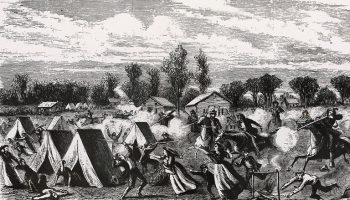
AS SHE STOOD In the PODIUM on Drucker Day 2021 and introduced Joseph Maciariello as the recipient of the Drucker Lifetime Achievement Award, Jean Lipman Blumen wanted the crowd to clearly understand the role he'd played to Peter Drucker for several years.
To do this, she used a good example not from the realm of management, but from English literature.
Maciariello's work reminded her of James Boswell's tireless plan to Samuel Johnson. The end result was Boswell's Life of Johnson, which many consider one of the biggest examples of literary biography.
\”That is the model we see replicated in Joe's selfless devotion to Peter Drucker and Peter's astounding life's work,\” Lipman Blumen said.
An accomplished scholar and inspiring teacher whom many regard as Drucker’s legitimate successor, Maciariello died July 1 at his home in Claremont. He was 78.
For more than 40 years, Maciariello belonged to the university community, serving first inside a joint appointment as Horton Professor of Economics at that which was then Claremont Graduate School and Claremont McKenna College. More recently he had served because the Drucker Institute's academic and research director along with the Marie Rankin Clarke Professor of Social Science and Management Emeritus along with a Senior Fellow at the Drucker School.
Maciariello stewarded the Peter Drucker legacy in the years after Drucker’s death.
The Drucker community mourns the passing of somebody who had been not just a careful steward from the Drucker legacy but also a sort, warm, and thoughtful colleague, mentor, and friend.
“Joe really embodied the idea of approaching management like a liberal art,” said Professor Katharina Pick, interim dean from the Drucker School of Management. She sent a message about Maciariello’s passing towards the Drucker community last week. “Over the years, I got to understand Joe as a funny, kind, gentle human being, an ample and supportive colleague, and a true Drucker scholar. This is a huge loss for the community and I will miss him.\”
Maciariello's passing drew similar responses from Drucker alumni and friends around the Drucker School's social networking account, especially Facebook.
\”One of the greatest, most challenging professors I had at Drucker,\” wrote Brad Bargmeyer (MBA '99; MA, Politics, '00). MBA grad Mark Luna added that Maciariello was \”the Drucker School of Management's final link to Peter Drucker. I had been among the fortunate ones to take his top class, Drucker on Management, which was a complete 14 weeks. I still make reference to the program assignments.\”
(Read more comments about Maciariello here)
Early Years & Early Drucker Connections
BORN IN 1941 IN TROY, NEW YORK, Maciariello was the son of Italian immigrants and grew up within the upstate mill town of Mechanicville. He attended Rhode Island's Bryant College, where he graduated summa cum laude with a degree in business administration, and Union College in Schenectady, Ny, where he received a master's degree in industrial administration and served as a person in the school.
Maciariello told interviewers that his Schenectady years were happy ones. He met his wife Judy in 1969 and they married in 1970 and shortly started their family.
It seemed to be during this period that he first discovered Drucker’s writings while working as an economic analyst and controller for Hamilton Standard, which was active in the Apollo space program.
The space program project was complex, also it created many challenges for managerial culture. Maciariello couldn't find a company manual to help him address these issues, so he searched his local libraries in Connecticut for an answer. This is when he came across Drucker's The Practice of Management.
Later, as he and Drucker were colleagues, Maciariello told him about his discovery and how he’d applied that book to the problems he was experiencing at Hamilton Standard.
“Peter said to me, ‘you had no alternative,’ and it wasn’t an ego statement,” Maciariello recalled. “He was right. There have been no alternative books out there. He wasn’t bragging — he was stating a well known fact.”
Thanks towards the support of his colleagues at Union College, Maciariello was able to enroll as a doctoral student in economics at Ny University.
Maciariello first encountered Drucker himself at NYU; Drucker was teaching there, also it was the first time he'd an opportunity to experience Drucker's idiosyncratic lecture style-spinning wider and wider circles of history and philosophy around a specific management question before zeroing in on an answer.
Maciariello earned his doctorate at NYU in 1973, and his dissertation advisor was economist William Baumol, who had been twice considered for that Nobel Prize in Economics.
Moving to Claremont
WHEN FRIENDS ALERTED HIM about a job opening at what was then known as the Claremont Graduate School, Maciariello requested the position. In 1979, he and the family moved to Claremont, where he accepted some pot professorship at Claremont McKenna College and CGS.
As an East Coaster, Maciariello said he didn’t know much about Claremont or Southern California. Actually, he explained, all he knew was “that Drucker was there, and that was my primary attraction.”
For 26 years, Maciariello and Drucker were close colleagues. He told an interviewer that he recognized Drucker as that rarity, a real Renaissance person, and the man made every effort for connecting with his senior colleague whenever possible.
\”If he needed a ride somewhere, I gave him a ride,\” he said. \”And I usually had many questions for him.\”
In 1999, they started working closely together on a quantity of projects and kept going until Drucker's death in 2005.
\”He was ill at that time,\” Maciariello said, \”but I had the legs and that he had the brains. So we managed to get work.\”
The 'Legitimate Successor'
REFERRING TO LIPMAN BLUMEN’S COMPARISON, James Boswell had been a gifted thinker and writer in the own right, and also the same was true of Maciariello.
Three years after Drucker's death, he published a revised version of Drucker’s 1973 classic Management-to which he added his deep knowledge of systems–to satisfy the requirements of executives these days.
He would go on to amplify and expand on Drucker's legacy in many other books as well, including Drucker's Lost Art of Management: Peter Drucker's Timeless Vision for Building Effective Organizations, The Daily Drucker, and A Year With Drucker: 52 Weeks of education for Leadership Effectiveness.
“Joe was the ultimate scholar and gentleman. More than anyone, he promulgated the philosophy of Peter Drucker around the world, in many industries, as well as in many different types of organizations,” said Bernie Jaworski, who is the Drucker chair in Management and the Liberal Arts. “He'll be sorely missed by his colleagues – by the rest of the people whose lives he's touched.”
Maciariello also lectured widely on a vision he shared with Drucker: the requirement for corporate leadership to be more socially aware and also to feel a larger obligation to uplifting and helping society. He lamented the absence of such leadership within the 2008-09 financial meltdown throughout a TEDx talk that he gave in Orange County. Watch here.
In the past few years, he'd caused the Shao Foundation along with the California Institute of Advanced Management, which established the Joseph A. Maciariello Institute of Management like a Liberal Art.
Along with the Drucker School’s lifetime achievement award in 2021, he also received an honorary doctorate from HHL Leipzig, Germany's oldest business school (founded in 1898), in 2021.
During the Leipzig ceremony, Richard Straub, president from the Peter Drucker Society Europe, introduced Maciariello, proclaiming that \”nobody else on the planet is better positioned for that mandate of advancing Drucker's monumental legacy because they build on the foundations he left and refashioning them to fit the future.\”
In a job interview with HHL Leipzig Professor Timo Meynhardt, Meynhardt described him \”as the legitimate successor, not only to advance Peter Drucker's legacy but additionally having contributed in many ways to advance his work.\”
Meynhardt also asked Maciariello what he thought their own legacy could be, and that he said he hoped to become remembered as a person of integrity.
\”Your purpose is constantly on the change as you change, and the closer we get to our senior amount of time in an occupation or in life, the greater serious that question becomes,\” he explained. \”It certainly was for Drucker. That's the way he taught it, and that's the way he lived it and that i saw the power of it. And thus I'm very dedicated to it.\”
A Personal Tribute
FOR MANY IN THE DRUCKER COMMUNITY, Maciariello is going to be remembered not just for his scholarly custodianship from the Drucker legacy but in addition for his humanity.
One of those is Jeremy Hunter, who is the founding director of the Executive Mind Leadership Institute. Maciariello helped and advised Hunter in his early focus on self-management. Eventually, Hunter recalled, Maciariello asked him, “What is your opinion is the most important quality a human being should cultivate?”
Hunter’s response was: “unconditional love.”
“Instantly, he beamed,” Hunter said. “I think it what food was in that moment that people became friends.”
Hunter’s friendship with Maciariello would deepen when Hunter was later in need of a kidney transplant. Unknown to him was the truth that Maciariello was the UCLA record holder for the longest-living kidney transplant.
“His intimate counsel about his experience illuminated a normally dark path for me,” he explained. “Test is insufficient to express the gifts which i, or any of us, caused by Joe. He would be a great man who put aside his own try to preserve the legacy of some other great man. Joe in the humility and wisdom truly lived from the spiritual center.”
Maciariello is survived by his wife Judy; two sons, Patrick Anthony (Aleeza) of Laguna Hills, and Joseph Charles (Lauren) of Mill Valley; a brother, Lawrence; five wonderful grandchildren, Callie, Reese, Grace, Alice, and Charlie; as well as many brilliant nieces and nephews.





